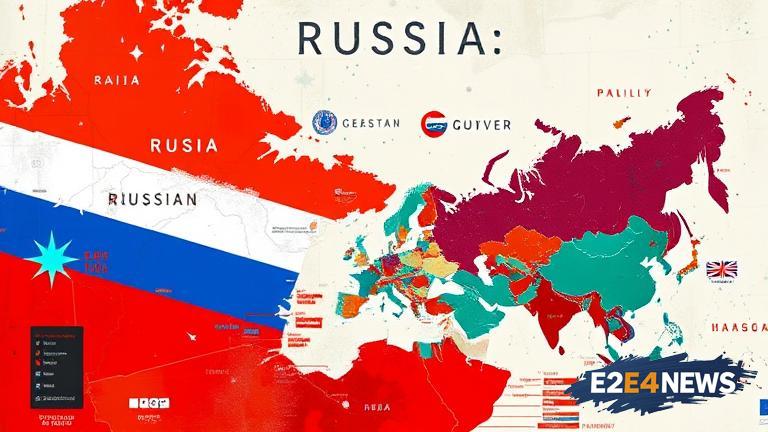Russia has been making headlines in recent weeks with its assertive moves in the global arena, leaving many to wonder about the motivations and consequences of its actions. The country’s leadership has been actively engaging in diplomatic efforts, seeking to strengthen ties with key partners and expand its influence in various regions. One of the key areas of focus has been the Middle East, where Russia has been working to establish itself as a major player in the region’s complex geopolitics. This has involved building relationships with key countries such as Iran, Turkey, and Saudi Arabia, as well as engaging in high-level diplomatic talks with other stakeholders. Russia’s efforts in the Middle East have been driven in part by a desire to expand its energy exports and secure new markets for its oil and gas products. At the same time, the country has also been seeking to promote its own security interests in the region, including by supporting the Syrian government in its fight against terrorist groups. In addition to its activities in the Middle East, Russia has also been active in other parts of the world, including Europe and Asia. The country has been seeking to strengthen its relationships with key European countries, including Germany and France, while also engaging in diplomatic efforts with major Asian powers such as China and India. Russia’s global ambitions have not been without controversy, however, and the country has faced criticism from some quarters for its actions in Ukraine and other parts of Eastern Europe. The United States and other Western countries have been particularly vocal in their criticism of Russia’s moves, accusing the country of seeking to undermine regional stability and expand its influence through coercive means. Despite these challenges, Russia remains committed to its goals and is likely to continue playing an active role in global affairs in the months and years ahead. The country’s leadership believes that its actions are necessary to protect its national interests and promote its position as a major world power. As the global landscape continues to evolve, it will be important to watch Russia’s moves closely and consider the potential implications for international relations and global security. The country’s actions will likely have significant consequences for a range of countries and regions, and will require careful consideration and analysis from policymakers and experts around the world. In terms of its economic interests, Russia is seeking to diversify its exports and reduce its dependence on oil and gas sales. The country is also looking to attract foreign investment and promote its own domestic industries, including in areas such as technology and manufacturing. Russia’s diplomatic efforts have been led by its foreign minister, Sergey Lavrov, who has been actively engaging with his counterparts from other countries to promote Russian interests and resolve key international issues. The country’s president, Vladimir Putin, has also been playing a key role in shaping Russia’s global agenda, using his platform to articulate the country’s vision and goals. Overall, Russia’s recent moves in the global arena reflect a broader shift in the country’s foreign policy, as it seeks to assert its influence and promote its interests in an increasingly complex and competitive world. As the country continues to evolve and grow, it will be important to watch its actions closely and consider the potential implications for global politics and economies. Russia’s actions will likely have significant consequences for a range of countries and regions, and will require careful consideration and analysis from policymakers and experts around the world. The country’s leadership is committed to its goals and is likely to continue playing an active role in global affairs in the months and years ahead. In conclusion, Russia’s latest moves in the global arena are a significant development that will have far-reaching implications for international relations and global security. The country’s actions reflect a broader shift in its foreign policy, as it seeks to assert its influence and promote its interests in an increasingly complex and competitive world. As the global landscape continues to evolve, it will be important to watch Russia’s moves closely and consider the potential consequences for a range of countries and regions.
